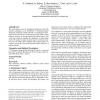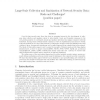103
click to vote
NSPW
2006
ACM
15 years 8 months ago
2006
ACM
What would a PKI look like if it were designed for implementability and deployability rather than strict adherence to a particular theoretical or mathematical model? This paper pr...
NSPW
2006
ACM
15 years 8 months ago
2006
ACM
Spyware, Adware, Bots. In each case, there is significant evidence that there is an increasing financial motivation behind the writing and distribution of these programs. In thi...
105
click to vote
NSPW
2006
ACM
15 years 8 months ago
2006
ACM
This work explores issues of computational disclosure control. We examine assumptions in the foundations of traditional problem statements and abstract models. We offer a comprehe...
117
click to vote
NSPW
2006
ACM
15 years 8 months ago
2006
ACM
Over the last several years, there has been an emerging interest in the development of widearea data collection and analysis centers to help identify, track, and formulate respons...
105
click to vote
NSPW
2006
ACM
15 years 8 months ago
2006
ACM
We study malware propagation strategies which exploit not the incompetence or naivety of users, but instead their own greed, malice and short-sightedness. We demonstrate that inter...
NSPW
2006
ACM
15 years 8 months ago
2006
ACM
The use of deception is one of many defensive techniques being explored today. In the past, defenders of systems have used deception haphazardly, but now researchers are developin...
112
click to vote
NSPW
2006
ACM
15 years 8 months ago
2006
ACM
In considering new security paradigms, it is often worthwhile to anticipate the direction and nature of future attack paradigms. We identify a class of attacks based on the idea o...
NSPW
2006
ACM
15 years 8 months ago
2006
ACM
This paper details a true and striking paradigm shift: the use of E-Prime for (at least) user-centered security, organizational/enterprise security policies and informal security ...
NSPW
2006
ACM
15 years 8 months ago
2006
ACM
Virtually every Internet user on the planet uses the powerful free tools offered by a handful of information service providers in many aspects of their personal and professional l...





